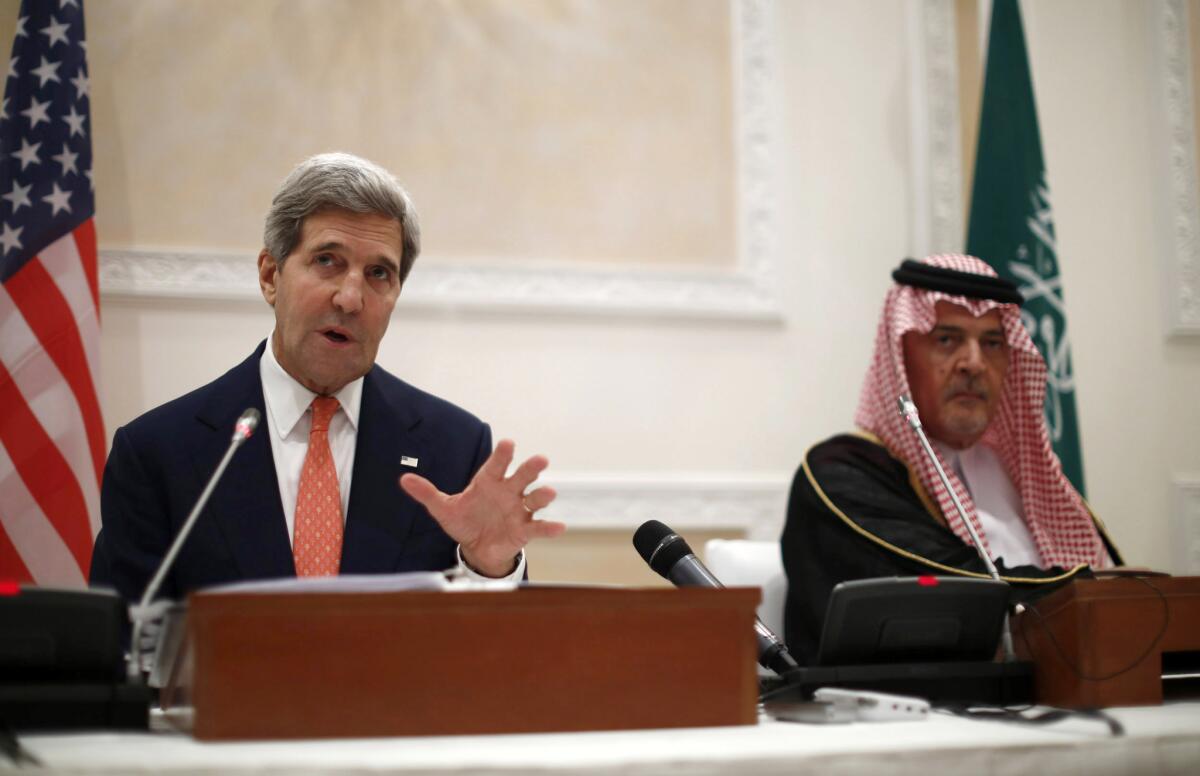U.S.-Saudi rift papered over by Kerry visit

- Share via
U.S. Secretary of State John F. Kerry’s visit with Saudi officials Monday put a smiling face on strained relations between longtime allies but probably did little to ease concerns in the kingdom that Washington has been too lax in confronting opponents in Syria, Egypt and Iran.
At a news conference with Saudi Foreign Minister Prince Saud al Faisal, Kerry praised the kingdom as “the senior player” in the Middle East and pledged fidelity to the “deep relationship” that has endured between Washington and Riyadh for 75 years.
But nagging policy conflicts and divergent views on the best path to peace could be heard between the lines of the two allies’ friendly posturing.
“A true relationship between friends is based on sincerity, candor and frankness, rather than mere courtesy,” the prince told reporters, alluding to what was apparently a strained exchange between the two diplomats.
Saudi Arabia last month made clear its pique over U.S. policy in the region when it rejected a seat on the United Nations Security Council, normally considered an influential platform given its members’ ability to set the world body’s agenda.
In a statement declining the two-year stint, Saudi officials lambasted the Security Council, on which the United States holds one of five permanent seats, for having failed over 65 years to bring peace between Israelis and Palestinians and “allowing the ruling regime in Syria to kill and burn its people” with chemical weapons. The Saudi Foreign Ministry statement also struck out at the council’s failure to ensure a nuclear-free Middle East, alluding to Western tolerance of atomic weapons widely suspected to be in Israel’s arsenal.
The Saudis appeared to be most aggrieved by the Obama administration’s decision against bombing military positions of Syrian President Bashar Assad after threatening for more than a year to punish any use of chemical weapons. A U.N. inspection team has confirmed that sarin nerve gas was used in attacks in rebel-held territory near Damascus on Aug. 21.
U.S. alarm over the evolving rift with Riyadh intensified in mid-October, when Prince Bandar bin Sultan, the Saudi intelligence chief, told European diplomats that the kingdom planned a “major shift” in its relations with Washington. The comments made behind closed doors, and promptly leaked to U.S. and European media, criticized U.S. inaction on Syria, indecision after the July military coup in Egypt and Washington’s pursuit of better relations with Saudi archenemy Iran.
Kerry said at Monday’s joint news conference that he shared the Saudis’ frustration with the conflicts roiling the Middle East but urged persistence in working through U.N. diplomacy. He also sought to assure Riyadh that Washington remains steadfast in ensuring that Iran never obtains atomic weapons capability.
“The United States will not allow Iran to acquire a nuclear weapon. That policy has not changed,” Kerry said.
Middle East analysts say the U.S.-Saudi rift is serious but more the product of frustration with events in the region than anger over actual U.S. policy shifts.
“Nothing is ever resolved by one visit, but I think it went as well as could be expected,” Charles Ries, a retired career diplomat now serving as vice president for international affairs at Rand Corp., said of Kerry’s visit to Riyadh.
Ries described the Saudi rejection of Security Council membership as a “cri de coeur” to address strains in the relationship and said Kerry’s visit to Egypt ahead of his Riyadh stop had probably reassured the Saudis of a “softer” U.S. stance on the tumultuous aftermath of the “Arab Spring” in Cairo.
Simon Henderson, director of the Gulf and Energy Policy Program of the Washington Institute, said at the outset of Kerry’s diplomatic repair mission that conflicting signals have come out of Riyadh lately and that an impression has taken shape that the kingdom “is rather leaderless and has a dysfunctional government.”
Barbara Slavin, senior fellow at the Atlantic Council’s South Asia Center, characterized the Saudi gestures of frustration of late as “a temper tantrum.” In the same discussion with Henderson and Voice of America anchor Carol Castiel, Slavin said Riyadh’s attitude toward Washington has been deteriorating for a decade, after the U.S.-led toppling of Saddam Hussein, which she said has exposed Iraq to Iranian influence that is resented by the Saudis.
Much of the frustration, the analysts say, stems from the lack of any more effectual ally to which Riyadh could turn, as former European colonial powers such as Britain and France have even less influence in the Middle East and Riyadh is unlikely to find much common purpose with Russia or China.
ALSO:
Iran: Thousands rally against U.S. on hostage anniversary
India set to launch Mars mission, provoking criticism over cost
Hundreds of masterpieces, possibly looted by Nazis, found in Germany
A foreign correspondent for 25 years, Carol J. Williams traveled to and reported from more than 80 countries in Europe, Asia, the Middle East and Latin America.
More to Read
Sign up for Essential California
The most important California stories and recommendations in your inbox every morning.
You may occasionally receive promotional content from the Los Angeles Times.











